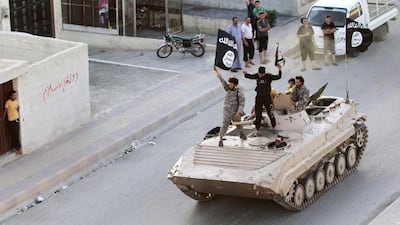An eerie feel is emerging from Iraq about how the government forces perceive the continuing battle to retake Mosul, which enters its fourth week today. More than two years after the American-led campaign against ISIL began, one expects that the ground forces battling the group now have a realistic grip of its capabilities. But that does not seem to be the case in the battle of Mosul. And there is a lesson to be learnt as the United States opens a new front in Raqqa.
Reports from the ground suggest that Iraqi forces feel they are facing a different ISIL and that Mosul is a much harder battle than they initially anticipated. “My views about Mosul have changed after what I saw in Kirkuk,” Karwan Taha, a Kurdish fighter, told The Guardian after ISIL stormed Kirkuk a week into the anti-ISIL offensive in Nineveh.
The sentiment of fighters such as Mr Taha intensified even more over the past few days. A result of three poor assessments that came crashing down last week.
The first one was that Iraqi and American forces were uncertain about ISIL’s calculations for Mosul. With few exceptions, the militants typically withdrew from a losing battle even if they would initially resist before they wire the city with improvised explosive devices and flee. The IEDs would prove to be a massive challenge for the government forces sometimes months after the group withdrew. The costly pattern made their withdrawal from Mosul a possibility. The United States allowed them safe passage through the vast desert area west of Mosul, and officials even made public statements that fleeing was an option.
Second, the pattern of withdrawal also inflated the Iraqi forces’ confidence that the battle in Mosul, while it will certainly be more challenging given the large population and territory, would at least follow the same template. Statements along the lines that the battle would be over within days or weeks and that ISIL was done in Iraq were common.
Finally, disinformation about the internal situation within ISIL and Mosul portrayed ISIL as crumbling even before the government forces began the campaign. Officials cited – as yet unverified – incidents of internal or popular rebellions against ISIL and that ISIL leaders and fighters already fled the city. Such reports are understandable – as part of the psychological warfare to confuse the group amid difficulties for the militants to communicate inside and outside the city.
But the group’s intention to defend the city to the last man should not have been doubted. Disinformation about internal fracture speaks of poor understanding of a group that been preparing for the fight in Mosul since the first air strike in August 2014.
The assessments have been damaging to the Iraqi forces instead. It is now clear that the almost certain victory will come against the backdrop of significantly more destruction and human casualty. The federal police has already sustained heavy losses in Kirkuk and areas south of Mosul, and protracted fighting might burn out the elite forces that currently serve as the backbone of the operation.
The speech by Abu Bakr Al Baghdadi on Thursday left no room for doubts about what the group will do. In his first statement since December, Al Baghdadi ordered his followers to stand and fight – the first time an ISIL leader commanded followers not to flee. The order to fight until the end also indicates the group has chosen Mosul to be a long and ugly war, otherwise Al Baghdadi would not risk making such a rare order publicly.
Al Baghdadi’s remarks set a trap for the US. ISIL’s decision to stand and fight adds to the urgency of starting a planned offensive to isolate and retake Raqqa, an effort that has already begun. The Americans wanted an offensive in Raqqa to maintain the momentum against ISIL. After Al Baghdadi’s speech, a campaign at the outskirts of Raqqa might be deemed even more necessary to ensure ISIL is stretched thin in its two capitals. But while the logic is sound, an assault on Raqqa will be rushed and counterproductive.
Raqqa is not Mosul and Syria is not Iraq. The composition of the forces fighting in Mosul presents an opportunity for Iraq to rebuild Mosul and begin a process of reconciliation. Syria lacks such forces. Syrian opposition forces, the only popularly acceptable force that should retake and hold the city, do not yet have the ability to do so. The US has consciously avoided relying on them for the effort. Instead, American officials insist that the Kurdish-dominated Syrian Democratic Forces (SDF) should spearhead the fight to retake Raqqa.
The SDF is perceived suspiciously locally, and American officials know this full well. Why would Washington ask Shia militias to stay out of Mosul, for example, but insist the SDF lead the Raqqa onslaught? Some in Washington say that the SDF will only pave the way for local fighters to enter the city. But the real fighting will be inside Raqqa and the Arab components within the SDF are poorly equipped for such a task.
The US had two years to train local fighters who could enter Raqqa. The offensive has begun, yet Brett McGurk, the US special envoy to the anti-ISIL coalition, says training platforms for local fighters are only now ready and some locals have signed up.
The full remark by Mr McGurk about preparations for Raqqa says it all: “The forces that we want as a vanguard to that force are locally based Arab forces who know the terrain and know the territory,” he told PBS on Saturday. “We have a number of them already signed up. We have the training platforms ready to go.”
Hassan Hassan is a resident fellow at the Tahrir Institute for Middle East Policy and co-author of ISIS: Inside the Army of Terror
On Twitter: @hxhassan

